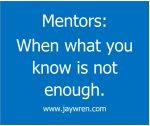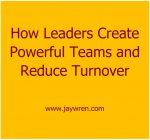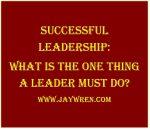Mentors: What is a mentor? How can a mentor help you? What skills do you need to benefit from mentoring? What type of mentoring will work effectively for you?
Mentors: A Source of Power or A Waste of Time?
For many people, a mentor is a source of inspiration, wisdom, and solutions.
Some people rely on their mentor for mental and emotional direction. In my case, I have a friend who has a great ability to see things in perspective. He mentors me when I am concerned about the things that happen in my life.
In other cases, mentors with practical or professional experience can help you make decisions on your education, health, career, finances, or business. Again, in my case, I have had mentors whose professional experience helped me solve problems in my business. In other cases, their knowledge helped me network with people who had experience that my mentors lacked.
“The Coach” Who Mentored Tech Geniuses
From 1974 to 1979, Bill Campbell was head coach of the football team at Columbia University. Later in his career, he became chairman of the board of trustees of Columbia University and chairman of the board of Intuit. Furthermore, he served as vice president of marketing and as a board director for Apple and held other positions on advisory boards and as a corporate executive.
Steve Jobs at Apple, Larry Page at Google, and other tech executives referred to Campbell as “The Coach” for his mentoring skills in helping them with their careers.
Even the superstars of industry have mentors to help them throughout their careers.
Are You Wasting Your Time?
Well, yes, you might be.
The person who is mentoring you might not be able to help you. A valuable mentor is not just someone who listens to your problems.
Specifically, mentors are helpful when they listen to you and help you gain perspective, wisdom, or information to solve problems.
What Qualities Do You Need to Use a Mentor?
People who benefit from mentoring must can keep an open mind. Furthermore, they must have the desire to learn from others.
Specifically, people who benefit from mentoring have the emotional intelligence to park their ego when people tell them things they may not like.
Therefore, to benefit from a mentor, you must have an open mind to accept different ideas. If you are a person who does not like to hear the point of view of other people, you will have trouble listening to a mentor.
Lastly, you must be at a point where you want what a mentor can offer. My first mentor had a very successful business. In this case, I enjoyed his being around him and hearing about his success. Specifically, learning what he was doing helped me learn about the things that I needed to do.
Working with a Mentor Requires a Commitment on Your Part.
Benefitting from a mentor requires that you do a few things.
First, stay in touch with your mentor. At the least, you need to call your mentor. Furthermore, meeting with your mentor once a week or even more often helps a great deal.
Second, you need to listen to your mentor. Some mentors are helpful by listening to you. However, if you do all the talking, you will not learn much from your mentor.





